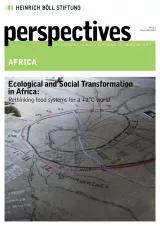While stories about the “fantastic” have a long tradition in oral and written storytelling in Africa, the continent is rarely associated with speculative fiction. This is slowly changing, however. Nigerian-American writer Nnedi Okorafor’s award-winning books are reaching a mainstream audience. On the continent, several initiatives are working hard to change perceptions. Omenana, a tri-monthly magazine from Nigeria, has been publishing speculative-fiction writers from across Africa and the African diaspora since 2014.
Chiagozie Fred Nwonwu, one of Omenana’s founders, spoke to Perspectives about the budding genre and the challenges it faces.

Perspectives: Why do you think that Africa is not generally associated with speculative/ science-fiction writing?
Nwonwu: I’ve had to respond to this very question several times in the past. While I initially always stated that it comes from a feeling of disrespect for the continent that makes people not reckon with Africa, I’ve come to understand that there is a question of ignorance. People simply don’t know much about the genre in the continent.
This is not helped by the fact that many writers in the continent tend to look down on the genre. It’s like someone, or some people, decided that speculative fiction is the inferior cousin of literary fiction and subconsciously taught enough of those who are involved in creative writing in the continent the same disrespect, so that it is now a culture.
I remember Nnedi Okorafor had to push back when her book Zarah the Windseeker was rejected for an African literary award because it is speculative fiction. We’ve come so far since then, but the reaction to speculative fiction works getting nominated for the Caine Prize also shows that this disrespect endures. I read a Nigerian writer on Facebook dismissing the Caine Prize because of this fact. He thought it has lost prestige because writers of the speculative, who own the fact that they are speculative fiction writers, got the nod.
I use the phrase “own the fact” here because the two stories that earned Elnathan John – who I consider one of the most profound voices of my generation – his Caine nods fall under what Omenana classifies as speculative fiction. BUT, I do agree that classifications are problematic. So while it is true that many writers here read and write speculative fiction, I get the feeling that the genre isn’t respected. To answer the question, the reasons are various, but one is that people do not readily identify their work as speculative fiction; another is the need for more light to be thrown on the genre in the continent.
You touched on the issue of definitions. How would you define what’s African speculative fiction and what’s not?
My definition of speculative fiction is a little broader than what the average writer in Nigeria would allow. If a story has elements of the metaphysical, I will classify it as speculative fiction. If it’s set in a future or in a place that isn’t here and now, I will classify it as speculative fiction. As such, stories of gods and devils, of extraordinary imagination attempting to answer the question “what if?” fall into this category. What if people have wings? What if gods walk among men? What if I could travel in time? What if I could walk through walls? What if we could live on Mars? What if I could read minds? What if?
How strong is the genre in actual fact? Who are some of its main figures?
The genre is quite strong in the continent, especially in South Africa, where Jungle Jim [a bimonthly pulp-fiction magazine based in Cape Town] holds sway. It’s also big in Nigeria, where a vibrant comic-book industry throws up some very interesting characters. Since starting Omenana, we have also encountered people from East Africa.
It’s really hard to get to mentioning names because I am sure I will miss out important ones, so I will just say that we at Omenana have been very lucky to have had some of the biggest names of African heritage writing speculative fiction send us their stories. Yes, several were on the Caine shortlist. And, of course, we are happy to have been here for many new writers to send us their stuff.
What do you think inspires African sci-fi writers the most? Is it the fascination with the endless possibilities of the future or simply dissatisfaction with the current realities?
This is a very good question, and also a tough one. To answer, I may have to look to myself and those writers I and my partner have worked with.
The past, the longing for it, especially knowing that it held mysteries that have now been lost to time and colonialism is a heavy influence. As such, you find many writers trying their best to recapture and share the wonder that was the glory days of our ancestors.
The present also acts as a muse, and African writers, just like they do everywhere else, use the stories around them as a mine from which their wild stories sprout.
I see far fewer stories about the endless possibilities that the African future holds, and I think that stems from the shared reality of gloom across African countries. There is too much turmoil in the now, and we mostly don’t see anything that hints at a future with possibilities. When we do get stories about the future in Omenana, we are not shocked to see dystopias and future reflections of the discord of the present.
What are, if any, some of the main themes in African sci-fi writing? Do they distinguish the genre in Africa from other places?
I think one thing we’ve done very well in our sci-fi is to interrogate the human reality. Many of the stories I see deal with interpersonal relationships in a place and time different from the now. You find that our writers still expect us to hold on to what we’ve come to know as African values of family, respect and obedience. I don’t know why writers from the continent, whose people are perhaps the most changed by colonialism, expect those character traits to endure into the future, but that theme is common enough.
But if you are asking if there is something distinctive about the genre in Africa, I would say that – and the fact that fantasy isn’t necessarily considered fiction here. So we do need to come up with better classifications for the genre [laughs].
To what extent do you see a convergence or divergence between the futures imagined on the continent and the “Afrofutures” emerging out of the United States?
I don’t really see much of a convergence, other than the fact that Afrofuturism co-opts elements of real and imagined African cultures. I think the US movement was necessitated by a different reality than what is obtainable in much of Africa. Where we can complain about the grave damage European colonialism did to our culture and to our psyche, we can’t say we know first-hand, in the main, what it means to exist in a culture where racism is in force – let’s strike the South Africans from this statement. What I am trying to say is that our experience is vastly different from what is common to our brothers and sisters in the diaspora.
What we do here isn’t Afrofuturism, at least not of the US variant. Our futurism isn’t part of a movement, beyond the need to tell stories. Speculative fiction isn’t new to us, and our ancestors had stories of interstellar travel before the first white or Arab man came. So we continue with this tradition, because it’s what we do.
While there is a political and cultural purpose for Afrofuturism in the United States, here, I think, our writers just want to tell their own stories. Whatever political or cultural leaning comes from those stories is purely coming from the individual writer, rather than a collective wish to influence politics or culture. Maybe one day we will get to the point where a couple of us will decide to use influence as a collective, but now we just try to tell our stories, one word at a time.
How do you see the genre develop, and what’s Omenana’s role going to be in it?
The development of the genre in Africa is assured. We are seeing more writers embrace the tag “speculative-fiction writer” without shame or attempting to do it as an aside to writing literary fiction. I do hope that we will see more writers do science fiction and perhaps better explore the African mythology.
Also, we have copious amounts of material in our cities. These “urban legends”, if you will, need harnessing, and amazing tales could stem from them. Already, we do see great storytelling from such nuggets now and then, and Omenana has published several. We will also be partnering with Narrative Landscapes, a new publishing outfit, to put out a special edition that focuses on urban legends.
I think Omenana’s role is already defined. The magazine gives stories of the speculative a home. We hope the writers of the speculative in the continent see Omenana and know that all their story needs to be is good and we will run it, and pay for it.
A grant we got from Science Fiction and Fantasy Writers of America allowed us to increase what we pay for submissions from 3000 naira to 10 000 naira [25 Euros]. We hope we get more of such grants and increase the pay, which will encourage more submissions. We do want the magazine to remain free, because we want everyone to read the stories.
Yeah, we do have great ambitions for the genre and the magazine, and there is just so much we can do, but we hope to keep doing our best. The dream is to be able to just work on Omenana, but what we do at the moment is work to get money to fund it, NGO-ish.


